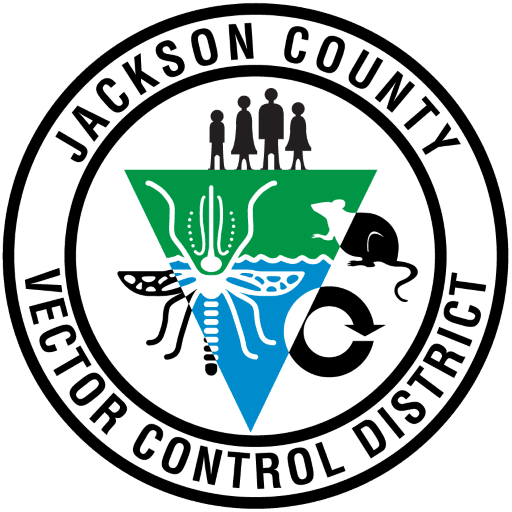Surveillance is an essential part of integrated mosquito management. JCVCD monitors mosquito populations throughout Jackson County in order to make informed decisions regarding control measures.
Adult Mosquito Surveillance
Mosquito abundance and species composition are primarily determined by trapping. Some traps are placed at fixed locations year after year and some are strategically relocated. Each week from April-October, JCVCD monitors approximately 50 mosquito traps at fixed locations and places "floater" traps in other areas where we suspect mosquito activity may be occurring. JCVCD primarily uses four types of traps:
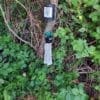 Encephalitis Virus Surveillance (EVS) Traps – These traps use CO2 gas emitted by dry ice to capture host-seeking female mosquitoes. These traps attract a wide variety of mosquitoes, including many of our nuisance species like Aedes sierrensis and Aedes vexans and our primary disease vectors like Culex pipiens and Culex tarsalis.
Encephalitis Virus Surveillance (EVS) Traps – These traps use CO2 gas emitted by dry ice to capture host-seeking female mosquitoes. These traps attract a wide variety of mosquitoes, including many of our nuisance species like Aedes sierrensis and Aedes vexans and our primary disease vectors like Culex pipiens and Culex tarsalis.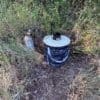 Biogents Sentinel Traps – BG Sentinel traps can use a variety of C02 sources in addition to a synthetic human scent lure to attract mosquitoes. These traps catch a wide variety of mosquitoes, depending on the specific lure combination used.
Biogents Sentinel Traps – BG Sentinel traps can use a variety of C02 sources in addition to a synthetic human scent lure to attract mosquitoes. These traps catch a wide variety of mosquitoes, depending on the specific lure combination used.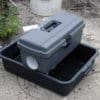 Gravid Traps – These traps are generally used in urban and suburban settings. They utilize water, usually with the addition of some type of organic material (hay, grass, leaves, yeast, etc.), to attract female mosquitoes looking for a place to lay their eggs. Egg-laying (gravid) mosquitoes will have had a blood meal and are more likely to be infected with diseases. This trap works best to catch our primary disease vector, Culex pipiens.
Gravid Traps – These traps are generally used in urban and suburban settings. They utilize water, usually with the addition of some type of organic material (hay, grass, leaves, yeast, etc.), to attract female mosquitoes looking for a place to lay their eggs. Egg-laying (gravid) mosquitoes will have had a blood meal and are more likely to be infected with diseases. This trap works best to catch our primary disease vector, Culex pipiens.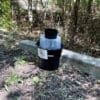 Biogents Gravid Aedes Trap (BG-GAT) – These are specifically designed to target non-native mosquito species, namely Aedes aegypti and Aedes albopictus, which prefer to lay eggs in water-filled containers around people’s homes. Aedes aegypti were found in Jackson County (first Oregon record) in 2024.
Biogents Gravid Aedes Trap (BG-GAT) – These are specifically designed to target non-native mosquito species, namely Aedes aegypti and Aedes albopictus, which prefer to lay eggs in water-filled containers around people’s homes. Aedes aegypti were found in Jackson County (first Oregon record) in 2024.Larval Surveillance
 Our trained field technicians inspect hundreds of known and potential mosquito sources every year for the presence of larvae. This is done by using standard dipping techniques to look for various stages of immature mosquitoes. If larvae or pupae are found, the technician determines and records the stage of development (instar) and the average number of larvae per dip. A larval sample will often be collected and reared in our lab to determine the exact species. Knowing the relative abundance, stage of development and species of larvae present helps us decide what control measures if any, need to be taken.
Our trained field technicians inspect hundreds of known and potential mosquito sources every year for the presence of larvae. This is done by using standard dipping techniques to look for various stages of immature mosquitoes. If larvae or pupae are found, the technician determines and records the stage of development (instar) and the average number of larvae per dip. A larval sample will often be collected and reared in our lab to determine the exact species. Knowing the relative abundance, stage of development and species of larvae present helps us decide what control measures if any, need to be taken.
Disease Surveillance
 JCVCD tests mosquito pools for diseases like West Nile virus and Western equine encephalitis using real-time reverse transcriptase polymerase chain reaction (RT-PCR). Although we collect a variety of mosquito species, our disease surveillance program focuses on mosquitoes from the Culex genus, which are our primary disease vectors.
JCVCD tests mosquito pools for diseases like West Nile virus and Western equine encephalitis using real-time reverse transcriptase polymerase chain reaction (RT-PCR). Although we collect a variety of mosquito species, our disease surveillance program focuses on mosquitoes from the Culex genus, which are our primary disease vectors.
